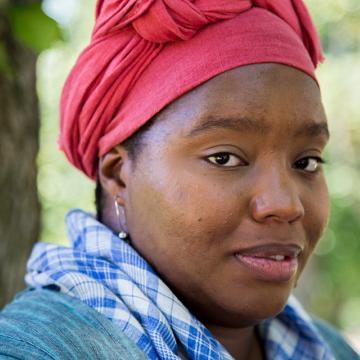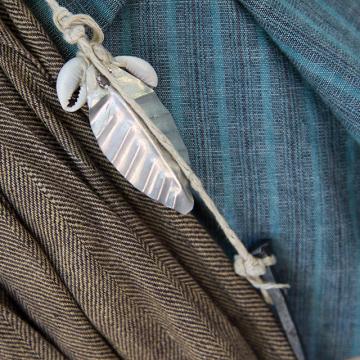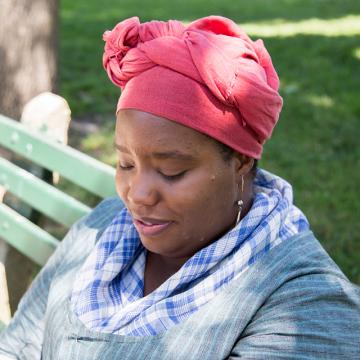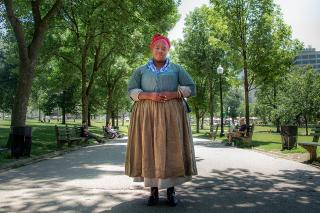We met with Cheyney to discuss her work as a living historian and her mission to change the narrative of slavery through authentic historical interpretations.
At the edge of the Boston Common amidst the commotion of the Park Street T station is where we meet Cheyney McKnight '11. Dressed from head to toe as an 18th century enslaved woman, she stands out among the frenzy of Boston's many commuters. But McKnight doesn’t notice the inquisitive glances from onlookers — because as a living historian and owner of Not Your Momma's History, this is her typical uniform.

"Not Your Momma's History consults with museums, historical sites, and schools in order to help them discuss slavery," says McKnight. “Whether it's through lectures, staff training, interpretations or hearth cooking — the purpose is to encourage these sites to have a meaningful conversation with their guests about the enslaved community."
As a living historian, attire is an integral component of her lectures. McKnight focuses on every detail to ensure an authentic representation. Today her outfit includes a reproduction of a runaway slave's blue and white checkered neckerchief, and a charm hanging from her waist that was traditionally worn for protection. Often, she uses these details as a starting point in her historical interpretations — 18th and 19th century African headwraps being her specialty.
"I attack a topic from all sides," explains McKnight. "People might come in expecting a lovely, frilly message about headwraps. Instead, I start in Africa with the different ethnolinguistic groups and the purpose of headwraps there. Then I’ll discuss headwraps within enslaved communities, as well as the accounts of white observers and their perception of headwraps. Having a well-rounded interpretation is important to me."
McKnight has built her career around changing the narrative of slavery in America. When you attend one of her lectures, you're presented with a multifaceted understanding of the subject matter. There’s a story, a person and a purpose behind each article of clothing and every recipe. By approaching the subject of slavery in this manner, McKnight’s historical interpretations challenge listeners to recognize the humanity of the enslaved community.
"These narratives are powerful and bring a more nuanced view of our history," says McKnight. "If you see a human being and not a caricature, it changes how people see racism and how they interact with society."

Although McKnight’s lectures are rooted in history, she also highlights the lasting legacy of slavery in today’s politics. In her ongoing performance art series entitled, #SlaveryMadePlain, McKnight connects participants with the past. Launching this series on July 4, 2017, McKnight dressed as an enslaved woman, stood in lower Manhattan and held a sign with Frederick Douglass' famous quote: "What to a slave is the 4th of July?"
"The rhetoric of the Revolution was 'we're fighting for our freedom,'" explains McKnight. "But the men who were fighting against English oppression, were themselves oppressing and enslaving people. I wanted to dig a little deeper — not ruin everyone's holiday — but recognize that this is our history. We’re Americans now because of the Revolution, but let’s not lose sight of what led us to today and all the work we still have to do."
I think I'm making a difference. In the end, that's what makes this all worth it.
In today's charged political climate, not everyone is receptive of McKnight’s message. She’s no stranger to harassment, bigoted comments — and even threats of violence. Because of these negative reactions, McKnight must continuously remind historical sites that her safety is an issue during her visits.
But this doesn’t discourage McKnight. If anything, it proves the importance of the mission of Not Your Momma’s History.
"It can definitely be traumatizing," McKnight admits. "I've actually been collecting data on other Black costumed interpreters, and I'm finding high rates of depression and anxiety. But I think this work is needed and it’s a message that everyone needs to hear. We just need to show our support."

McKnight attributes much of her success to the support she has received from others. Friends and colleagues have provided her access to research and materials because they find value in the work she's doing. Despite some negative reactions, there are plenty of people who are eager to discuss the lasting impact of slavery in today’s society.
"You have to remember that there are people out there who support you," says McKnight. "And that's one of the things that makes Simmons so great. Whenever anything happens, my Simmons ladies will send me messages on Facebook, and I got a few letters from some women from Simmons in support, and I feel very confident that I'll have that for the rest of my life."
With a growing community of supporters, McKnight continues her mission of educating the public about slavery. For her, the message is what matters most — and the potential to change people's minds is what keeps her going.
As she puts it, "I think I'm making a difference. In the end, that's what makes this all worth it."

